| Srl | Item |
| 1 |
ID:
163112
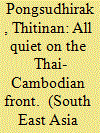

|
|
|
|
|
| Summary/Abstract |
That Thai-Cambodian relations are stable and peaceful after Thailand’s most recent military coup in 2014 is counterintuitive and inconsistent with recent trends and dynamics. When governments loyal to Thaksin Shinawatra took power over the past decade, bilateral relations were cordial and constructive. Conversely, when anti-Thaksin governments were in office, Thai-Cambodian relations became unstable and adversarial. But this has not been the case after the military regime under General Prayut Chan-ocha seized power and overthrew the Thaksin-aligned government of Prime Minister Yingluck Shinawatra. The dominant strand of scholarly explanations attributes the volatile bilateral relationship to Thai historical forces interacting with domestic politics, underpinned by a ‘national humiliation’ discourse dating to French imperialism. But such an informed understanding is unable to pinpoint the timing and extent of the bilateral conflict when it flared up. Synthesising overlapping streams of literature and drawing on select interviews, this article sets out to demonstrate that the post-coup Thai government’s commitment and resolve to prevail at all costs ahead of the royal succession and the incumbent Cambodian government’s weakened political legitimacy at home have combined to situate and normalise bilateral relations on a new plateau.
|
|
|
|
|
|
|
|
|
|
|
|
|
|
|
|
| 2 |
ID:
103644
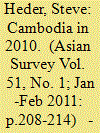

|
|
|
|
|
| Publication |
2011.
|
| Summary/Abstract |
Prime Minister Hun Sen's power became more concentrated. The economy expanded but was said to need diversification. Inequality intensified conflicts, but development generated legitimacy, while the political opposition and civil society were attacked. A U.N.-assisted court convicted five ex-Khmer Rouge leaders. Ties with China, the U.S., and Thailand improved.
|
|
|
|
|
|
|
|
|
|
|
|
|
|
|
|
| 3 |
ID:
094520
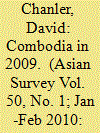

|
|
|
| 4 |
ID:
125215
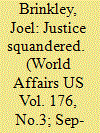

|
|
|
|
|
| Publication |
2013.
|
| Summary/Abstract |
Cambodian Prime Minister Hun Sen was preparing to fight a civil war in 1997 when a senior United Nations official stopped by to ask if he'd like help putting the former leaders of the Khmer Rouge on trial. With a figurative wave of the hand, Hun Sen, a former Khmer Rouge commander himself, said in effect: Sure, go ahead. At that moment, his mind was obviously elsewhere.
|
|
|
|
|
|
|
|
|
|
|
|
|
|
|
|
| 5 |
ID:
173687
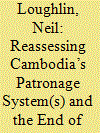

|
|
|
|
|
| Summary/Abstract |
The dominant literature on Cambodian politics over the past two decades suggested that a mixture of elite and mass clientelism had enabled the hegemonic Cambodian People’s Party (CPP) to rule via competitive but authoritarian elections, while lessening its previous reliance on repression and violence. Such explanations did not predict the upswing in contestation in the country in 2013 and thereafter. Neither do they account for the crackdown that followed. Following literature that draws attention to the tensions in building and maintaining political coalitions under authoritarianism, and demonstrating the difficulties in maintaining competitive authoritarianism over time, this article draws attention to structural, institutional, and distributional impediments to the CPP leadership in building and maintaining effective reciprocal relations with electoral clients while simultaneously balancing the interests of the military and other elites at the core of the regime. To make its argument, the article compares weaknesses in the CPP’s electoral clientelism with the effectiveness of patronage within the security forces, seen through the lens of Cambodia’s experience of land dispossession. It shows that an extractive and exclusive political economy privileged the interests of regime insiders over potential mass electoral clients precisely during the same period the CPP was supposed to be securing its hold on power via mass electoral clientelism. This further explains why the regime fell back on repression over reform in response to the upswing in contestation manifest from 2013, and why, despite the failings of its mass patronage project, repression has nevertheless been successful as a strategy for regime survival during a period of heightened popular contestation.
|
|
|
|
|
|
|
|
|
|
|
|
|
|
|
|
| 6 |
ID:
173690
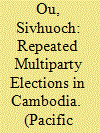

|
|
|
|
|
| Summary/Abstract |
The United Nations (UN) introduced multiparty elections to Cambodia in 1993 in the hope of bringing about democracy in that country. Ironically, the two-and-a-half decades of uninterrupted elections have led to an ever-more authoritarian government under Prime Minister Hun Sen and the Cambodian People’s Party (CPP). Authoritarianism under the single-dominant party system began in 1997, but has intensified since 2017 with the ban on the leading opposition party. While concurring that repetitive elections have consolidated authoritarianism, this paper argues that elections are not merely tools that authoritarian leaders deploy to hold on to power. Elections are arguably mechanisms that have compelled the CPP to offer several extraordinary economic policy concessions since 2013; this is the first argument of the paper. The developments have created a win-win scenario for the rulers and the ruled—the authoritarian leaders prolong their rule, and the masses have more disposable income, among various benefits. The second argument is that such policy concessions are made only when the ruling party senses critical challenges from the opposition and voters. This paper contributes to the literature arguing that multiparty elections in electoral authoritarian regimes extract economic policy concessions.
|
|
|
|
|
|
|
|
|
|
|
|
|
|
|
|
| 7 |
ID:
119743
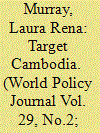

|
|
|
|
|
| Publication |
2012.
|
| Summary/Abstract |
Phnom Penh-The 328 acres known as Boeung Kak Lake still appear on maps of Cambodia's capital as a large blue patch, though its waters are now only a memory. Pumped full of sand, the area is being readied for a promised development that has already displaced some 4,000 families. Looming over the puddles and dirt, two massive billboards display portraits of the high-end residential and commercial wonderland intended for the plot.
|
|
|
|
|
|
|
|
|
|
|
|
|
|
|
|